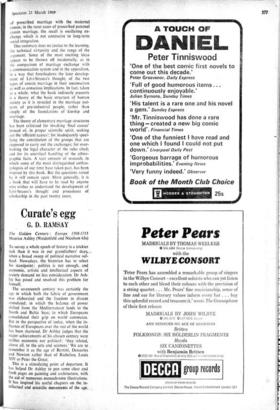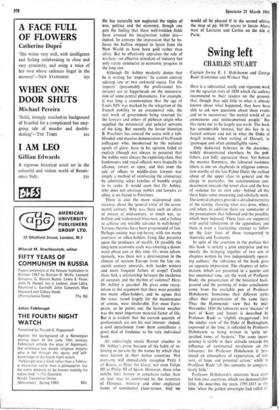Curate's egg
G. D. RAMSAY
The Golden Century : Europe 1598-1715 Maurice Ashley (Weidenfeld and Nicolson 63s)
To survey a whole epoch of history is a trickier task than it was in our grandfathers' days, when a broad sweep of political narrative suf- ficed. Nowadays, the historian has to select his standpoint : politics is not enough, and economic, artistic and intellectual aspects of society demand no less consideration. Dr Ash- ley has posed and resolved this problem for himself.
The seventeenth century was certainly the age in which both the fabric of government was elaborated and the freedom to dissent stimulated; in which the balance of power shifted from the Mediterranean lands to the North and Baltic Seas; in which Europeans consolidated their grip on world commerce. But in the perspective of today, when the in- fluence of Europeans over the rest of the world has been shattered, Dr Ashley judges that the major achievements of his chosen century were neither, economic nor political:.-`they related, above all, to the arts and sciences.' We are to remember it as the age of Bernini, Descartes and Newton rather than of Richelieu, Louis XIV or Peter the Great.
This is a stimulating point of departure. It has helped Dr Ashley to pen some clear and fresh pages on painting and architecture, with the aid of numerous monochrome illustrations. It has inspired his useful chapters on the in- tellectual and scientific movements of the age. He has naturally not neglected the topics of war,' politics and the economy, though one gets the feeling that these well-trodden fields have aroused his imagination rather less— indeed, he conveys the impression that he be- lieves the bullion shipped to Spain from the New World to have been gold rather than silver. But he effectively appraises the role of warfare—an effective stimulant of industry but only rarely conducive to economic progress in the long run.
Although Dr Ashley modestly denies that he is writing for 'experts,' he cannot entirely sidestep one or two awkward topics. For the `experts' (presumably the professional his- torians) are at loggerheads on the interpreta- tion of some central phenomena. For example, it was long a commonplace that the age of Louis XIV was marked by the relegation of the French nobility to an ornamental role, the real work of government being reserved for the lawyers and others of plebeian origin who supplied the ministerial and judicial servants of the king. But recently the Soviet historian B. Porchnev has entered the arena with a full- blooded and massive denunciation of his French colleagues who, mesmerised by the national epoch of glory, have in his opinion failed to explain (though not always to perceive) that the nobles were always the exploiting class, that landowners and royal officials were basically in alliance, covert or open, and that even the sale of offices to middle-class lawyers was simply a method of reinforcing the aristocracy by admitting select families of humble origin to its ranks. It would seem that Dr Ashley, who does not envisage nobles and lawyers as allies, is no friend to Porchnev.
There is also the more widespread con- troversy about the `general crisis' of the seven- teenth century. Why was there such an abyss of misery at mid-century, so much war, re- bellion and widespread bitterness, and a failure to achieve any notable advance in well-being? Various theories have been propounded of late. Perhaps society was top-heavy, with too many courtiers or office-holders living like parasites upon the producers of wealth. Or possibly the long-term economic cycle was entering a down- ward phase just at this time. Or, more adven-
turously, was there not a deterioration in the climate of western Europe from the late six- teenth century onwards, with harder winters and more frequent failure of crops? Could there lurk a relationship between the incidence of sunspots and the rhythm of violence? Here, Dr Ashley is guarded. He gives some recog- nition to the argument that there were possibly too many office-holders, and he agrees that the taxes, raised largely for the maintenance of armies, were intolerable. For most Euro- peans, as he points out, the harvest weather was the most important material factor of life. But it is evident that the current quarrels of professionals are not his real interest: indeed, a cool detachment from them contributes a good deal of freshness to his very individual book.
An endearingly exotic flavour attaches to Dr Ashley's prose because of his habit of re-
ferring to persons by the names by which they
were known in their native countries. Not everyone will immediately recognise Pyetr I of Russia as Peter the Great, nor even Felipe
III as Philip III of Spain. However, those who imbibe their history in armchairs rather than
on tour may be comforted by the retention of Florence, Antwerp and other anglicised forms of continental place-names. And we would all be pleased if in the second edition the map at pp. 98-99 ceases to locate Alsace west of Lorraine and Corbie on the site of Paris.











































 Previous page
Previous page